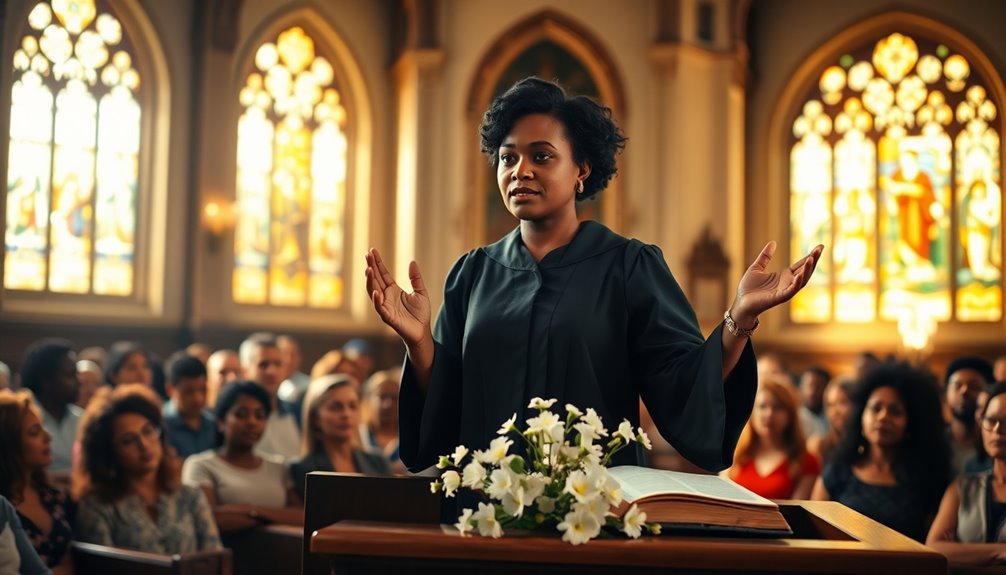Yes, women can be pastors, and many are actively serving in that role today. While some biblical passages, like 1 Timothy 2:11-12, seem to restrict women's leadership, others highlight their significant contributions in the early church. Figures like Deborah and Priscilla show a strong historical precedent for women in ministry. The ongoing debate between complementarianism and egalitarianism reflects differing interpretations within various denominations. More women are pursuing pastoral roles, transforming communities and enriching leadership. If you're curious about the evolving perspectives and contributions of women in ministry, there's more to uncover on this topic.
Key Takeaways
- The interpretation of biblical texts varies, with some supporting women's roles as pastors and others restricting them based on cultural context.
- Historical examples, such as Deborah and Priscilla, demonstrate that women have held leadership roles in biblical times and the early church.
- The growing presence of women in ministry reflects changing attitudes, with approximately 30% of U.S. congregations having women in significant leadership positions.
- Complementarianism and egalitarianism represent opposing views on women's roles in ministry, influencing church practices and beliefs today.
- Personal testimonies highlight the positive impact of female pastors on their communities, fostering empowerment and social justice initiatives within congregations.
Introduction
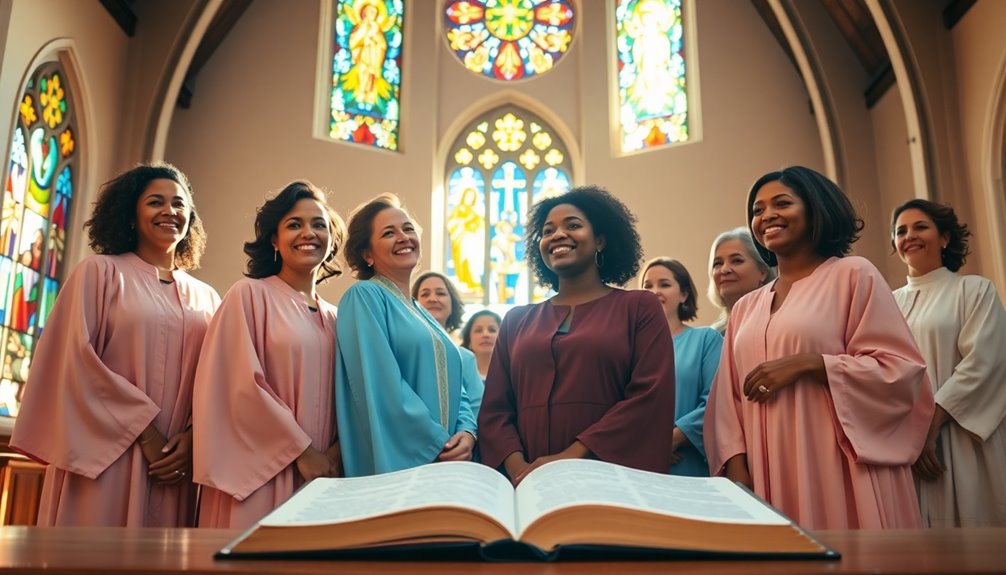
The conversation around whether women can be pastors is both complex and deeply rooted in historical and theological context.
You'll find that this debate often hinges on interpretations of key biblical texts, like 1 Timothy 2:11-12, which restricts women from teaching or exercising authority over men in church settings.
On one side, complementarianism argues for distinct roles, asserting that only men can serve as pastors. On the other hand, egalitarianism champions equal opportunities for women in ministry, leading to varied practices across denominations.
As you explore this issue, consider the historical examples of women in leadership roles within the early church.
Figures like Priscilla and Phoebe, along with deaconesses, challenge the notion that women should be excluded from pastoral authority.
Nowadays, more women are pursuing theological education and finding leadership positions in progressive congregations, reflecting a shift in acceptance.
However, ongoing discussions within denominations, such as the Southern Baptist Convention, reveal the tension between traditional interpretations of scripture and contemporary movements advocating for gender equality in church leadership.
Understanding these dynamics can shed light on the broader implications for the church and its future.
Biblical Texts on Women
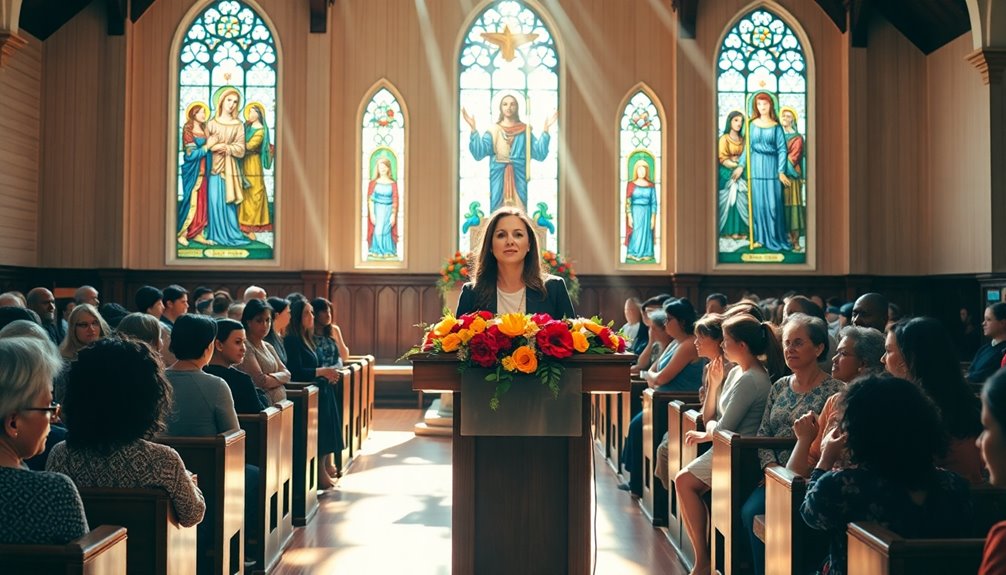
When you look at the Bible, you'll find verses that both support and challenge the idea of women in church leadership.
For instance, 1 Timothy 2:11-12 seems to restrict women's roles, while Galatians 3:28 highlights their equality in Christ.
These contrasting texts spark important conversations about women's place in ministry today.
Primary Bible References
In exploring the topic of women in pastoral roles, several key Bible references come into play. 1 Timothy 2:11-12 clearly states that women should learn in quietness and not teach or have authority over men, presenting a foundational argument against their pastoral participation. This passage sets the tone for much of the debate surrounding women's roles in church leadership.
Additionally, 1 Timothy 3 and Titus 1 outline qualifications for church leaders, emphasizing that these positions are reserved for men. While the New Testament does recognize women in leadership roles, such as Phoebe, a deacon in Romans 16:1, it stops short of endorsing women as pastors explicitly.
Paul's instructions in 1 Corinthians 11:5-6 show that women can pray and prophesy publicly, indicating some level of participation in ministry but not necessarily in a pastoral capacity.
The interpretation of Galatians 3:28, which suggests equality in Christ, adds another layer of complexity to the discussion. However, many still cling to the more traditional view that women shouldn't teach or have authority over men, framing the ongoing debate about women's roles in the church.
Secondary Bible References
Throughout the Bible, various secondary references highlight women's roles in spiritual leadership, providing a broader context for the discussion on female pastors. For instance, 1 Timothy 2:11-12 explicitly states that women shouldn't teach or have authority over men in the church, which many interpret as a prohibition against women serving as pastors.
However, this verse contrasts with others like 1 Corinthians 11:5, where Paul acknowledges women publicly praying and prophesying, suggesting they can participate in spiritual activities.
Additionally, examples of female leaders like Deborah in Judges 4-5 and Phoebe in Romans 16:1 illustrate that women held significant roles in spiritual leadership, even if their positions differ from contemporary pastoral roles.
Galatians 3:28 emphasizes equality in Christ, asserting that there's neither male nor female, which some argue supports women serving in all church roles, including pastoral positions.
Yet, the qualifications for church leaders in 1 Timothy 3:1-7 and Titus 1:5-9 are often interpreted as male-centric, reinforcing the complementarian viewpoint that limits pastoral roles to men.
These secondary references create a complex landscape for understanding women's spiritual authority in the church.
Ancient Women's Leadership Roles
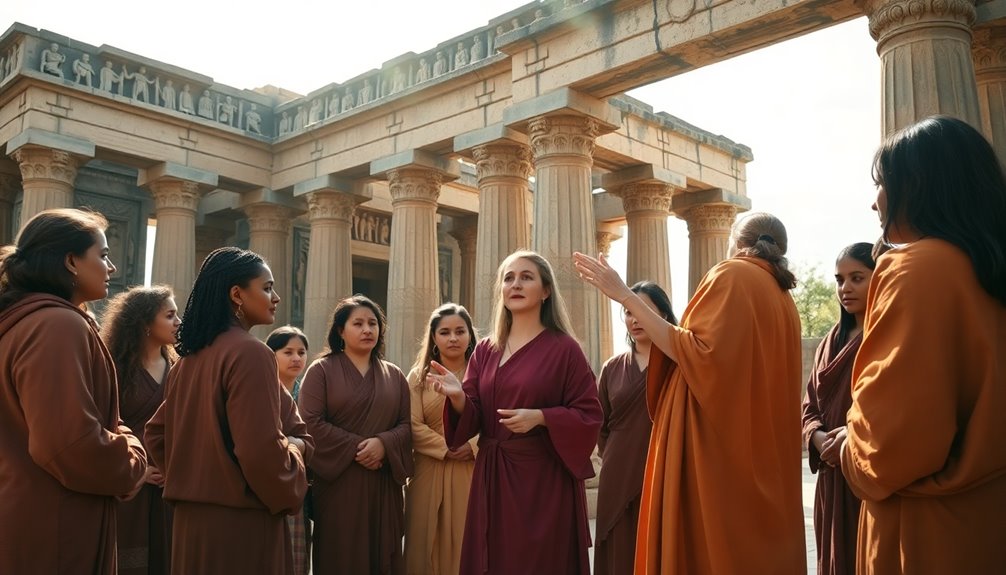
Ancient women often held remarkable leadership roles that shaped their communities and spiritual lives. In ancient Israel, figures like Deborah served as judges, wielding significant authority in both political and spiritual matters. Huldah, a prophetess during King Josiah's reign, provided divine counsel, showcasing that women held respected positions within the religious community. These examples highlight the substantial impact women had in shaping their society.
As the early church emerged, women continued to play vital roles in ministry. The New Testament mentions Phoebe, a deacon, and Priscilla, who taught Apollos, illustrating their active participation in church leadership.
Archaeological findings support this notion, revealing that women in the early Christian church engaged in prayer and teaching, reflecting a more inclusive approach to leadership.
Despite these contributions, the decline of women's leadership roles during the Middle Ages marked a significant shift. Cultural and institutional changes altered power dynamics in church governance, leading to a reduction in the visibility and influence of women in ministry.
Understanding these historical contexts can help us appreciate the complexities of women's roles in spiritual leadership throughout history.
Cultural Context of Scripture
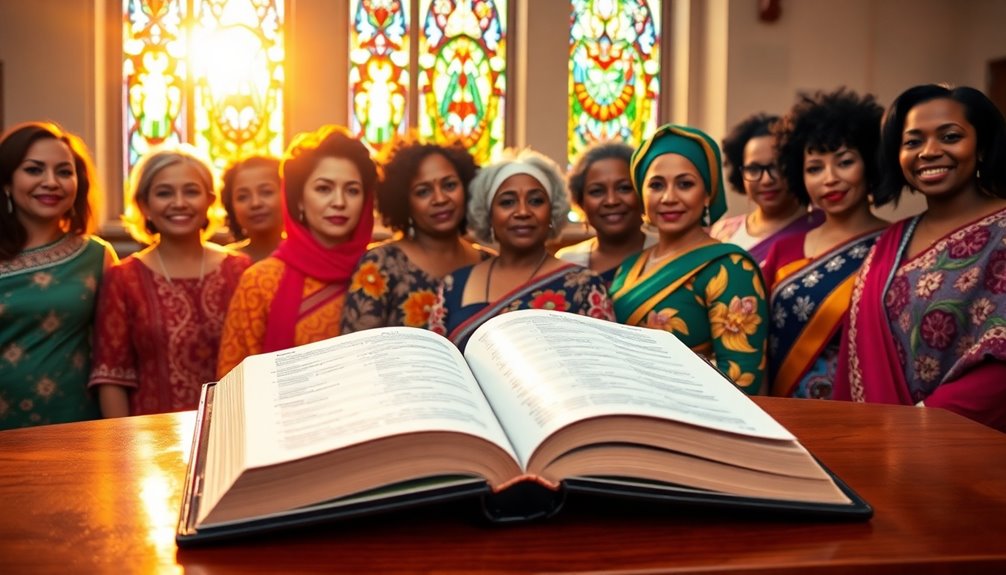
Understanding the cultural context of scripture is essential for interpreting passages related to women's roles in ministry. When you dive into 1 Timothy 2:11-12, you'll see that Paul's letter addresses specific issues in the early church of Ephesus, where false teachings were widespread. The societal norms of the first-century Greco-Roman world often left women without formal education, leading some to argue that Paul's restrictions were more about addressing these realities than establishing a universal ban on women in positions of authority.
Moreover, you'll find that women played various roles within the early church, including serving as deaconesses and hosting gatherings, indicating that cultural practices could adapt to allow for female leadership in certain contexts.
Paul's letters weren't meant to be blanket statements for all times and cultures; they were responses to specific community challenges. The historical oppression of women contrasts sharply with Jesus' teachings, which elevated their status.
Misunderstandings About Biblical Roles

You might find that many misconceptions about biblical roles stem from misinterpretations of scripture.
By examining the cultural context and the examples of women like Deborah and Priscilla, you can challenge these restrictive views.
It's essential to recognize that spiritual gifts aren't limited by gender, opening the door for a more inclusive understanding of church leadership.
Debunk Common Misconceptions
Misconceptions about women's roles in church leadership often stem from selective interpretations of scripture. Many point to 1 Timothy 2:12, claiming it prohibits women from teaching or holding authority over a man. However, this verse addressed specific cultural issues in Ephesus and shouldn't be viewed as a blanket rule for all churches today.
It's essential to recognize that the New Testament uses key Greek terms that differentiate between household roles and church leadership. This distinction challenges the notion that only men can occupy leadership positions.
Historical figures like Deborah and Huldah demonstrate that women have held significant authority in biblical times, contradicting the belief that such roles are exclusively male.
Moreover, spiritual gifts outlined in 1 Corinthians 12 aren't gender-specific, indicating that both men and women are equally endowed with gifts for ministry and leadership.
Contemporary interpretations of scripture emphasize the equality of all believers in Christ, as highlighted in Galatians 3:28. This understanding suggests that gender shouldn't restrict women serving as pastors or limit their contributions to the household of God.
Challenging Scriptural Interpretations
Challenging scriptural interpretations about women's roles in the church requires a closer look at the context behind key biblical passages. Take 1 Timothy 2:12, which some argue restricts women from teaching or having authority over men. It's crucial to consider that this was written in a specific cultural context in Ephesus, not necessarily a universal mandate.
You might also reflect on the early church, where women like Phoebe and Priscilla actively participated in ministry and teaching. These examples show that women as pastors aren't a modern invention but a continuation of biblical practice.
Moreover, the Greek terms for "man" and "woman" in these texts may encompass broader contexts than just husband and wife, allowing for more inclusive interpretations.
Historical figures like Deborah and Huldah illustrate that women held significant leadership roles in the Old Testament, challenging restrictive interpretations.
Contemporary theologians emphasize understanding these cultural contexts, advocating for a reevaluation of scriptural interpretations that limit women's roles in the church today. By examining these aspects, you can see a richer, more inclusive understanding of women in leadership roles unfolding within faith communities.
Real-Life Ministry Experiences
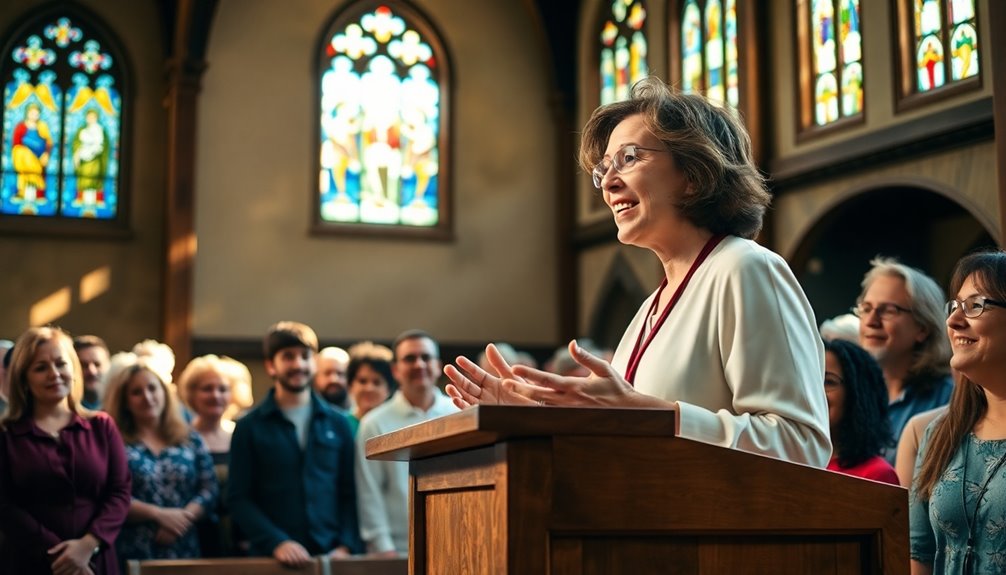
When you hear personal testimonies from women in pastoral roles, you'll often find stories of transformation and growth within their communities.
These experiences highlight the unique dynamics of local church leadership, where women's contributions are reshaping congregational life.
Let's explore how female pastors are influencing their churches and the impact they're making.
Personal Testimonies of Women
Women in ministry have shared powerful testimonies that illuminate their transformative experiences and impactful leadership. Many women recount feeling a strong call to ministry from a young age, pushing through societal and institutional barriers to fulfill their calling. Their personal testimonies highlight the resilience and dedication that characterize their journeys.
You might hear stories of women leading youth groups, preaching from the pulpit, and providing pastoral care, all of which demonstrate effective leadership within their congregations. These leaders often emphasize the importance of inclusivity, showcasing how diverse perspectives enrich church life. Through mentoring, they uplift and empower other women, fostering a sense of community and engagement.
Statistics back up these experiences, indicating a steady increase in women occupying pastoral roles. With more women enrolling in seminaries and becoming newly ordained ministers, their impact is undeniable.
As they lead initiatives addressing social justice issues, they continue to inspire and challenge the status quo. By sharing their personal testimonies, these women not only affirm their calling but also pave the way for future leaders, proving that women can and do thrive in ministry.
Local Church Leadership Dynamics
Often, local churches that embrace female leadership experience vibrant dynamics that enhance their ministry. When women step into leadership roles, like senior pastors or youth leaders, they bring unique perspectives that can transform the local church's outreach efforts.
Statistics show that about 30% of U.S. congregations have women in significant leadership positions, and this often leads to an uptick in community engagement and volunteerism.
Female pastors tend to prioritize social justice initiatives and community involvement, which can shift the church's focus toward broader societal issues. In these congregations, you might notice an increase in female participation in church activities, as women feel encouraged to take on leadership roles themselves.
The dynamics of leadership in these settings foster an inclusive environment, promoting collaborative decision-making.
Final Thoughts on Leadership
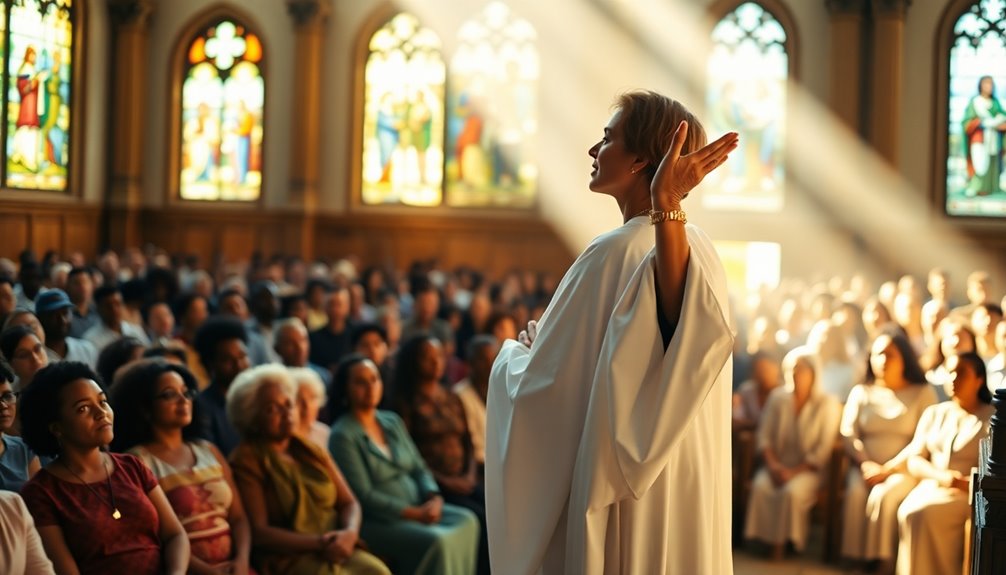
Navigating the complexities of leadership in the church requires a thoughtful examination of both scripture and tradition. Many people look to Paul's writings, especially 1 Timothy 2:11-12, which seems to restrict women from teaching or holding authority over men. This has fueled the debate between complementarianism, which supports distinct roles for men and women, and egalitarianism, which advocates for equal roles in ministry.
However, when you delve into the historical context, you'll find that women played significant roles in the early church. Figures like Phoebe and Priscilla were influential in teaching and leading, showcasing that women's contributions to ministry have deep roots.
As societal movements for gender equality gain momentum, more churches are reexamining their stances on women's leadership. The increasing number of women pursuing theological education reflects a shift in attitudes, pushing for a redefinition of leadership roles that embraces both men and women.
Ultimately, the question of whether women can be pastors hinges on how you interpret scripture in light of historical and contemporary practices. Embracing diverse perspectives can enrich your understanding of church leadership today.
Additional Resources
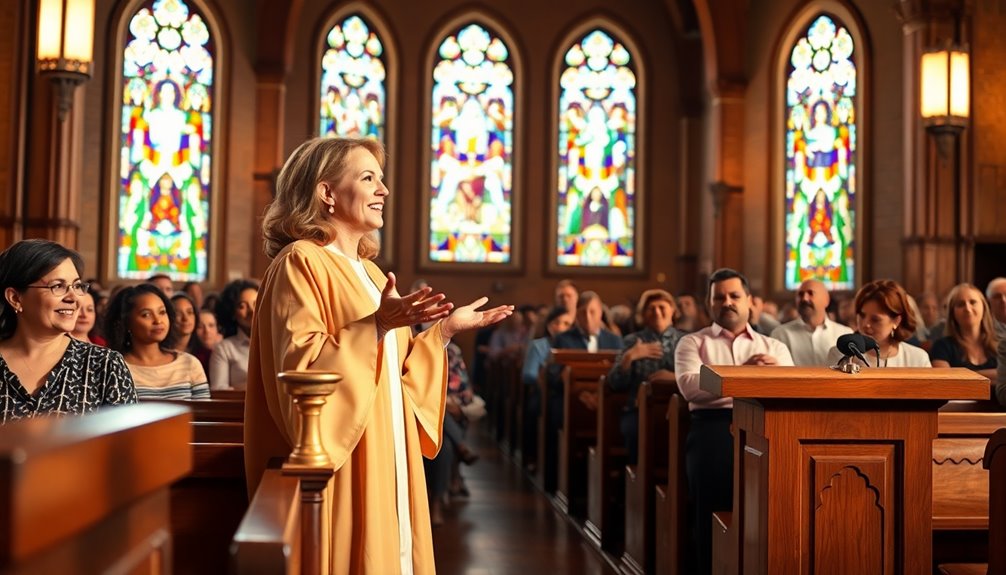
Exploring the topic of women in pastoral roles opens up a wealth of resources that can inform your understanding and perspective. Numerous denominations, like the United Methodist Church and the Episcopal Church, actively ordain women as pastors, which reflects a growing acceptance of female leadership in ministry.
You might want to look into theological schools, where around 50% of seminary students are now women, indicating a significant shift in educational pursuits within the church.
To dive deeper, consider reading about historical figures such as Phoebe and Priscilla, who played important roles in the early church. Their stories provide context and challenge traditional views on women's authority in ministry.
Additionally, research shows that churches led by women often report increased growth and engagement, further emphasizing the positive impact of female leadership.
Engage with various perspectives in the ongoing debate between complementarian and egalitarian views, consulting articles and books that explore both sides.
Frequently Asked Questions
Does the Bible Allow Women to Be Pastors?
When you ask if the Bible allows women to be pastors, you'll find a mix of interpretations. Some verses suggest restrictions, while others highlight equality in Christ.
Historical examples of female leaders challenge traditional views, showing that women can hold authoritative roles. As you explore this topic, consider how contemporary shifts in church leadership reflect a growing acceptance of women in ministry.
Ultimately, your understanding may evolve based on these diverse perspectives.
Is It Okay for a Woman to Be a Pastor?
It's absolutely okay for a woman to be a pastor. Many people today recognize that leadership in the church isn't limited by gender.
As you explore this topic, you'll find numerous examples of women thriving in pastoral roles, contributing their unique perspectives and gifts.
Embracing this inclusivity can enrich your faith community, fostering a diverse environment where everyone can grow and serve together, regardless of gender.
It's about calling and capability, not restriction.
Where in the Bible Does It Say a Woman Should Not Preach?
If you're looking for biblical references suggesting women shouldn't preach, you might consider 1 Timothy 2:12, where it states that women shouldn't teach or have authority over men in the church.
Additionally, 1 Corinthians 14:34-35 advises women to remain silent during church gatherings.
These passages are often cited to support the idea that preaching roles are reserved for men, reflecting a traditional interpretation of church authority and gender roles.
Is There a Such Thing as a Female Pastor?
Absolutely, there's such a thing as a female pastor. Many churches today actively embrace women in leadership roles, recognizing their ability to teach and guide.
You'll find female pastors leading congregations, delivering sermons, and providing spiritual support in various denominations. The growing acceptance reflects a shift toward inclusivity in ministry, showcasing that women can and do serve effectively in pastoral roles, contributing valuable perspectives and insights to their communities.

